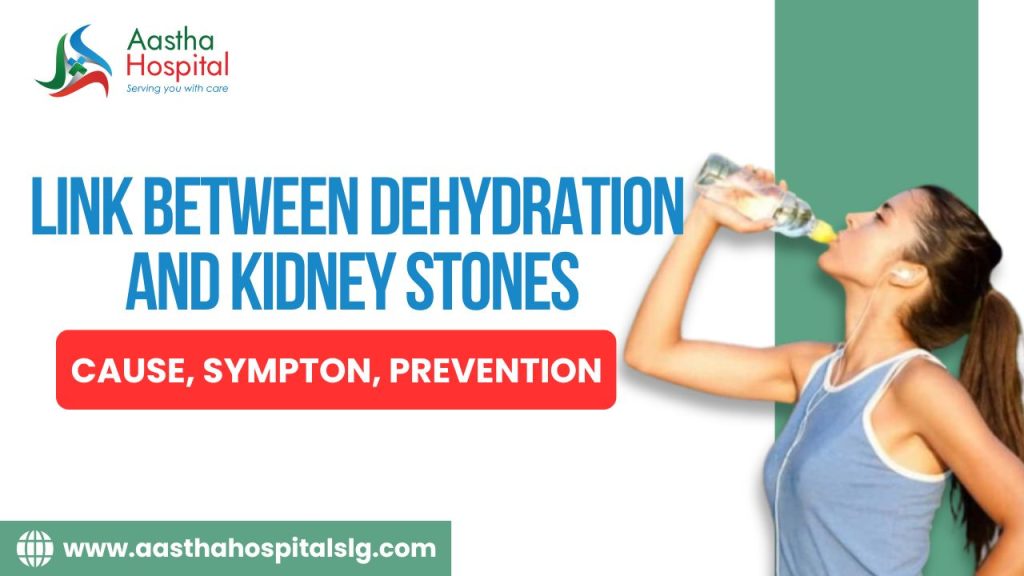As we dive into the summer months, it’s important to keep our hydration levels in check. One of the most crucial reasons for this is the strong link between dehydration and the formation of kidney stones. At Aastha Hospital, we are committed to providing you with the best health information to keep your kidneys healthy and your life vibrant.
Let’s explore the causes, symptoms, and preventative measures for kidney stones, particularly focusing on how staying hydrated can make all the difference.
Understanding Kidney Stones
Kidney stones are hard deposits made of minerals and salts that form inside your kidneys. They can affect any part of your urinary tract, from your kidneys to your bladder. Often, stones form when the urine becomes concentrated, allowing minerals to crystallize and stick together.
Types of Kidney Stones
- Calcium Stones: These are the most common type, usually in the form of calcium oxalate.
- Uric Acid Stones: More common in men, these form when the urine is too acidic.
- Struvite Stones: These can form in response to an infection.
- Cystine Stones: These are rare and form in people with a hereditary disorder that causes the kidneys to excrete too much of certain amino acids.
The Role of Dehydration in Kidney Stone Formation
Dehydration significantly increases the risk of kidney stones. When the body is dehydrated, the urine becomes more concentrated, meaning it contains less water to dissolve the salts and minerals. This leads to a higher chance of these substances crystallizing and forming stones.
How Dehydration Affects the Kidneys
- Concentrated Urine: Less water in the urine means higher concentrations of stone-forming substances.
- Reduced Urine Flow: Dehydration decreases the volume of urine, making it easier for crystals to stick together and form stones.
- Increased Risk of Infection: Dehydrated conditions can also increase the risk of urinary tract infections, which can lead to struvite stones.
Symptoms of Kidney Stones
Understanding the symptoms of kidney stones can help in seeking timely medical attention:
- Severe Pain: Pain in the side, back, and below the ribs.
- Painful Urination: Discomfort while urinating.
- Blood in Urine: Pink, red, or brown urine.
- Nausea and Vomiting: Often due to severe pain.
- Frequent Urination: Persistent need to urinate, often in small amounts.
- Fever and Chills: Usually indicative of an infection.
Preventing Kidney Stones through Hydration
The good news is that proper hydration can significantly reduce the risk of kidney stones. Here’s how you can stay ahead:
Drink Plenty of Fluids
- Water is Key: Aim for at least 8-10 glasses of water a day. Water helps to dilute the substances in urine that lead to stones.
- Citrus Drinks: Lemonade and orange juice contain citrate, which can help prevent stone formation.
- Consistent Intake: Keep a water bottle with you and sip throughout the day. Remember, if you feel thirsty, you’re already slightly dehydrated.
Dietary Adjustments
- Limit Salt Intake: Excessive salt can increase calcium in urine.
- Reduce Oxalate-Rich Foods: Spinach, beets, and nuts are high in oxalate, which can contribute to calcium oxalate stones.
- Moderate Protein Consumption: High animal protein intake can increase the risk of stones
Lifestyle Changes
- Regular Exercise: Staying active helps maintain healthy kidneys.
- Monitor Medication: Some medications can increase the risk of stones; consult your doctor if you have concerns.
- Avoid Sugary Drinks: High sugar intake can lead to an increase in stone-forming substances.
Additional Tips for Kidney Health
- Monitor Your Urine
Pay attention to the color of your urine. Clear or light yellow urine typically indicates good hydration, while darker urine can be a sign of dehydration.
- Balanced Diet
A diet rich in fruits, vegetables, and whole grains can help maintain optimal kidney function. Foods high in antioxidants can reduce inflammation and oxidative stress in the kidneys.
- Regular Check-Ups
Regular visits to your healthcare provider can help monitor kidney health and catch any potential issues early. Routine blood and urine tests can provide insight into how well your kidneys are functioning.
- Stay Cool
In hot weather, it’s especially important to stay cool to avoid dehydration. Wear lightweight clothing, stay in the shade, and avoid excessive physical activity during the hottest parts of the day.
- When to Seek Medical Help
If you suspect you have kidney stones, or if you’re experiencing any of the symptoms mentioned above, it’s crucial to seek medical attention. At Aastha Hospital, we offer comprehensive care and state-of-the-art treatments to help manage and prevent kidney stones.
Treatments Available
- Medication: To relieve pain and help pass the stones.
- Lithotripsy: A procedure that uses shock waves to break up stones.
- Ureteroscopy: A thin scope inserted into the urethra and bladder to remove stones.
- Surgery: In severe cases, surgical removal of stones may be necessary.
Conclusion
Kidney stones can be a painful and recurrent problem, but staying well-hydrated is a simple and effective way to reduce your risk. By making conscious choices about your hydration and diet, you can keep your kidneys healthy and functioning optimally. Remember, prevention is always better than cure, and at Aastha Hospital, we’re here to support you in every step of your health journey.
Stay hydrated, stay healthy, and enjoy a kidney stone-free life!
For more personalized advice and treatment options, visit us at Aastha Hospitals. We’re committed to your well-being and ready to help you achieve optimal health.


